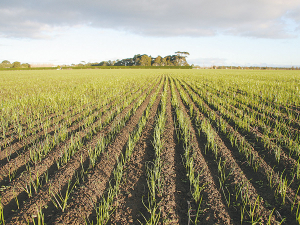Farmers Report Gains with Array Ryegrass
It may still be under the radar for many, but one new pasture has been making waves for three different farmers lately.
 Research shows ryegrass seed shown early in dry autumn conditions germinates well after weeks with no rain.
Research shows ryegrass seed shown early in dry autumn conditions germinates well after weeks with no rain.
For new pasture you can be proud of - even if it feels too dry to think about it right now - consider sowing seed before it rains, instead of waiting for the autumn weather to smile on you.
Research shows ryegrass seed sown early in dry autumn conditions germinates well after weeks with no rain, says Barenbrug pasture systems manager Blair Cotching.
"It can also grow more feed per hectare than seed sown later, and will probably persist longer too, giving you a better result all round."
Plus, you'll beat the rush for contractors when the rain does come, he says. "We've been asked so many times if it's okay to sow seed in the dry, we did a trial to confirm the answer."
In hot Waitako peat during an autumn drought, Barenbrug agronomists sowed perennial ryegrass seed with NEA2 endophyte in late February, March and April.
The earliest sowing had it the hardest - the soil reached over 49 degrees C at seed depth (2cm), with no rain for 43 days.
Even so, this February-sown seed went on to grow 2 tonnes of dry matter per hectare more than seed sown post-rain in April, and the endophyte was fine, Blair says.
Ryegrass seed sown after 1 March and before the rain comes is poised for growth as soon as conditions are right.
If seed is still in the bag when the weather breaks, it can't grow. By then everyone else wants to do the same thing, so contractors are flat out and delays are inevitable especially the way things are now.
Because it starts growing as soon as it has enough moisture, seed sown early becomes new pasture that is ready for its first grazing sooner than if you wait and sow after the rain.
Why does this matter?
"That first grazing has a massive impact on your pasture establishment," Blair says. "It helps the young ryegrass plants grow denser and stronger before winter, when wet soils and heavy cows can damage pasture. And it gets the clover off to a good start."
An added bonus - clover seed likes early sowing, too, because the soil is warmer.
The benefits of sowing early don't stop in the paddock. If this technique suits your farm and your soils, it will also help you get organised ahead of time.
That means no rushing around at the last minute trying to get hold of seed, and a lot more peace of mind knowing you're as ready as you can be for one of the most important jobs of autumn.
The 5+ A Day Charitable Trust has launched a collection of affordable recipes designed to turn everyday vegetables into seasonal stars.
Jane Mellsopp has been confirmed as the new Government Appointee to the New Zealand Meat Board (NZMB).
To celebrate the tenth anniversary of its annual Good Deeds competition, Rabobank will give away $100,000 to improve rural community hubs, schools, clubrooms, and marae across New Zealand.
Agricultural and veterinary product supplier Shoof International has appointed Michaela Dumper as its new chief executive.
Federated Farmers is celebrating following the Government's announcement that young farmers will be able to use their KiwiSaver funds to buy their first home or farm.
The Meat Industry Association of New Zealand (MIA) today announced that Chief Executive Officer Sirma Karapeeva has resigned from the role.